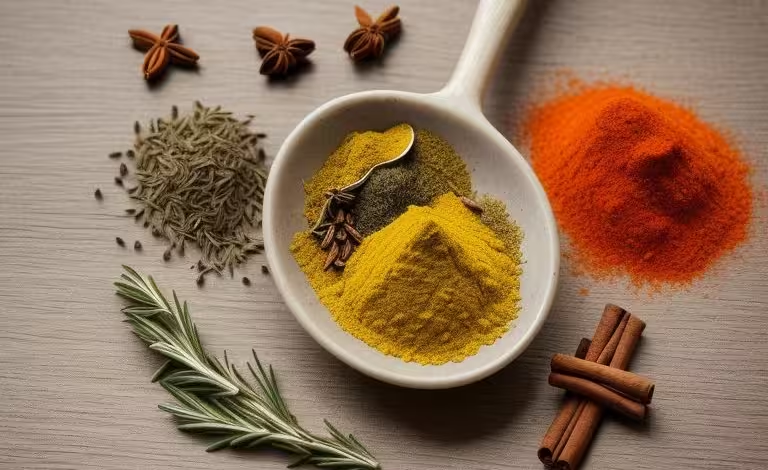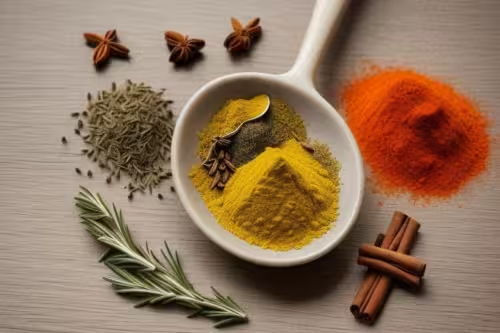8 Herbs and Spices That Fight Inflammation: Boost Your Health Naturally

8 Herbs and Spices That Fight Inflammation: Boost Your Health Naturally
Inflammation is a natural response that helps our bodies fight infections and heal wounds. However, when inflammation becomes chronic, it can lead to serious health issues such as diabetes and cancer. Diet plays a crucial role in managing inflammation, and incorporating certain herbs and spices can significantly help in reducing inflammation and promoting overall health. Let’s dive into these eight powerful anti-inflammatory ingredients and discover how they can benefit you.

1. Ginger
One of the most potent anti-inflammatory spices, ginger contains compounds like gingerol and zingerone. These active ingredients have been shown to reduce inflammatory markers such as C-reactive protein (CRP) and tumor necrosis factor-alpha (TNF-α). Adding ginger to your diet can be as simple as brewing a cup of ginger tea or adding freshly grated ginger to your stir-fries and soups.
Benefits of Ginger:
- Reduces pain and stiffness in osteoarthritis
- Aids in digestion and reduces nausea
- Boosts the immune system
2. Garlic
Known for its distinct flavor and medicinal properties, garlic is rich in sulfur compounds like allicin. Studies have demonstrated that garlic supplements can lower CRP levels and increase antioxidant activity in the body, thereby combating inflammation effectively. Garlic can be used in various dishes, from pasta sauces to roasted vegetables, making it an easy addition to your meals.
Benefits of Garlic:
- Lowers blood pressure and cholesterol levels
- Enhances detoxification
- Supports heart health
3. Turmeric
Perhaps the most researched spice for its anti-inflammatory benefits, turmeric contains curcumin. This compound has powerful antioxidant properties and can inhibit NF-κB, a molecule that triggers inflammation. Research suggests that turmeric supplementation can reduce inflammatory markers such as interleukin 6 (IL-6) and high-sensitivity CRP (hs-CRP). Incorporating turmeric into your diet is easy with recipes like golden milk, curries, and even smoothies.
Benefits of Turmeric:
- Improves brain function
- Alleviates symptoms of depression
- Supports joint health
4. Cardamom
Originating from Southeast Asia, cardamom not only adds a unique flavor to dishes but also offers anti-inflammatory benefits. Studies indicate that cardamom supplementation may decrease CRP, IL-6, and TNF-α levels, while boosting antioxidant defenses in the body. Cardamom can be added to both sweet and savory dishes, including teas, desserts, and rice dishes.
Benefits of Cardamom:
- Aids in digestion
- Reduces blood pressure
- Fights bad breath and cavities
5. Black Pepper
Piperine, the active compound in black pepper, exhibits anti-inflammatory effects. Animal studies have shown that piperine can reduce joint swelling and inflammatory markers associated with conditions like arthritis and asthma. Black pepper is a versatile spice that can enhance the flavor and health benefits of nearly any dish.
Benefits of Black Pepper:
- Enhances nutrient absorption
- Improves gut health
- Acts as a natural pain reliever
6. Cinnamon
Beyond its sweet aroma, cinnamon contains cinnamaldehyde, which possesses anti-inflammatory properties. Research suggests that cinnamon can lower CRP and interleukin 1 beta (IL-1β) levels, making it beneficial for managing inflammation. Cinnamon can be easily sprinkled on oatmeal, added to smoothies, or incorporated into baking recipes.
Benefits of Cinnamon:
- Regulates blood sugar levels
- Protects against heart disease
- Fights bacterial and fungal infections
7. Cayenne Pepper
Known for its spiciness, cayenne pepper contains capsaicin, a compound with potent anti-inflammatory and pain-relieving effects. Capsaicin supplementation has been linked to reduced inflammation and improved symptoms in arthritis and digestive disorders. Adding a pinch of cayenne pepper to your meals can provide a flavorful kick and numerous health benefits.
Benefits of Cayenne Pepper:
- Boosts metabolism
- Supports weight loss
- Relieves pain from headaches and migraines
8. Rosemary
Rich in rosmarinic acid, rosemary is a powerful antioxidant with anti-inflammatory properties. Studies have shown that rosemary supplementation can reduce oxidative stress and inflammatory markers in various diseases. Fresh or dried rosemary can be used to season meats, vegetables, and even bread.
Benefits of Rosemary:
- Enhances memory and concentration
- Supports liver health
- Reduces allergic responses
How to Incorporate These Herbs and Spices
Incorporating these herbs and spices into your diet not only enhances the flavor of your meals but also supports your body’s natural ability to fight inflammation. Here are a few tips on how to do it:
- Ginger Tea: Brew a cup of ginger tea by steeping fresh ginger slices in hot water.
- Garlic in Cooking: Add minced garlic to your pasta sauces, stir-fries, and roasted vegetables.
- Turmeric Smoothie: Blend a teaspoon of turmeric into your morning smoothie.
- Cardamom Coffee: Sprinkle ground cardamom into your coffee or tea for a unique flavor twist.
- Black Pepper Seasoning: Use freshly ground black pepper to season your salads, meats, and vegetables.
- Cinnamon Oatmeal: Sprinkle cinnamon on your morning oatmeal or add it to your baking recipes.
- Cayenne Pepper Spice: Add a pinch of cayenne pepper to your soups, stews, and marinades.
- Rosemary Roasts: Use rosemary to season your roasted meats and vegetables.
While these herbs and spices show potential in reducing inflammation, it’s essential to consult with a healthcare provider before starting any new supplements, especially if you have existing health conditions or are taking medications. Additionally, more research is needed to determine the optimal dosages and long-term effects of these natural remedies.
By adopting a diet rich in these anti-inflammatory herbs and spices, you can take proactive steps towards improving your health and well-being. Embrace the power of nature’s remedies and enjoy the delicious flavors that come with them!
Incorporate these natural anti-inflammatory agents into your daily routine and experience the benefits for yourself. Remember, small changes can make a big difference in your overall health.
Subscribe Now
Enroll for our free updates

Thank You for Subscribing
Thanks for Updating Your Information



